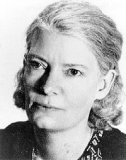The recent protests and demonstrations that began in Wisconsin in mid February prompted us  to profile Dorothy Day in March. Dorothy Day, co-founder (with Peter Maurin) of The Catholic Worker newspaper and the Catholic Worker movement, integrated her faith with social action. She is widely regarded for her work as a social justice and peace advocate.
to profile Dorothy Day in March. Dorothy Day, co-founder (with Peter Maurin) of The Catholic Worker newspaper and the Catholic Worker movement, integrated her faith with social action. She is widely regarded for her work as a social justice and peace advocate.
Her spiritual journey led her to admire the Catholic Church as the “church of the poor.” While covering a hunger march in Washington, D.C., for several Catholic magazines (Commonweal and America) on Dec. 8, 1932 she visited the Shrine of the Immaculate Conception and prayed for guidance on how to use her special gifts in service of the hungry and the poor. The answer to her prayer came quickly; the following day, back in New York, she met Maurin, an immigrant from France and former Christian Brother, who had a vision for a society constructed of Gospel values. It didn’t take long for the pair to publish the Catholic Worker newspaper, which debuted on May 1, 1933, selling for a penny a copy. Day’s front page editorial proclaimed the paper to be “for those who are huddling in shelters trying to escape the rain, for those who are walking the streets in the all but futile search for work, for those who think that there is no hope for the future, no recognition of their plight.” The Catholic Worker spawned a movement of Houses of Hospitality and farming communes that exist today across the United States and other countries.
Jim Forest, author and Day biographer, said of The Catholic Worker movement:
“Unlike many purely charitable endeavors to help the down-and-out, the Catholic Worker is also well known for acts of social protest. This aspect also dates back to the movement’s early days. Over the years, protests have been linked to such issues as the abuse of working people, efforts to prevent workers from organizing unions, homelessness, racism, anti-Semitism, conscription and war. The protest aspect of the Catholic Worker is an outgrowth of commitment to the works of mercy. For example, if we are called by Christ to offer a welcome to the homeless, by implication that means taking appropriate action to try to prevent people from being made homeless, either by poverty or war.”
Day practiced “advocacy journalism” in The Catholic Worker. The articles were designed to educate, interpret, and advocate resistance to social ills. Intellectual discourse and academic essays made the newspaper a major tool of education across the U.S. particularly on college campuses. It provided the working class with intellectual and theoretical enrichment – she wanted the newspaper to maintain a close relationship with ordinary men and women.
In 1971, Day was awarded the Pacem in Terris Award, named after a 1963 encyclical letter by Pope John XXIII that calls upon all people of good will to secure peace among all nations. Day was accorded many other honors in her last decade of her life, including the Laetare Medal from the University of Notre Dame in 1972.

